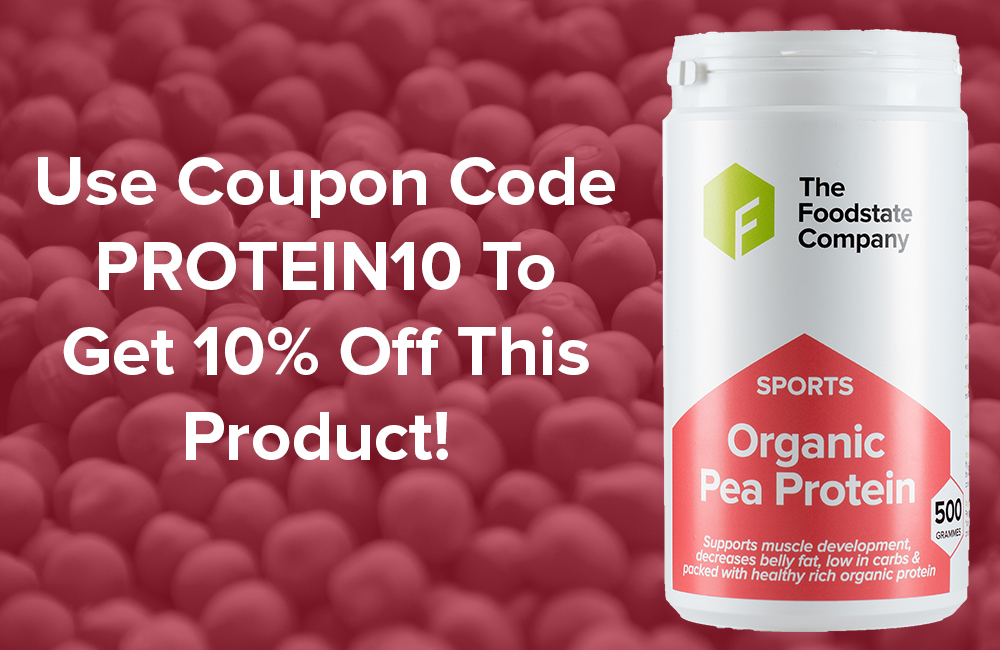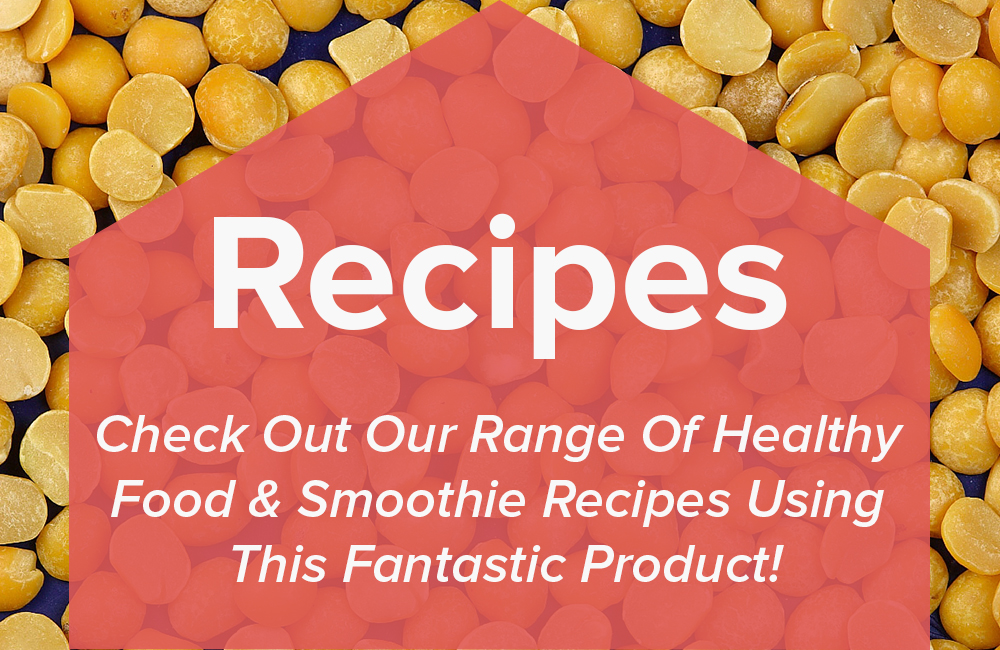Berry Breakfast Bowl
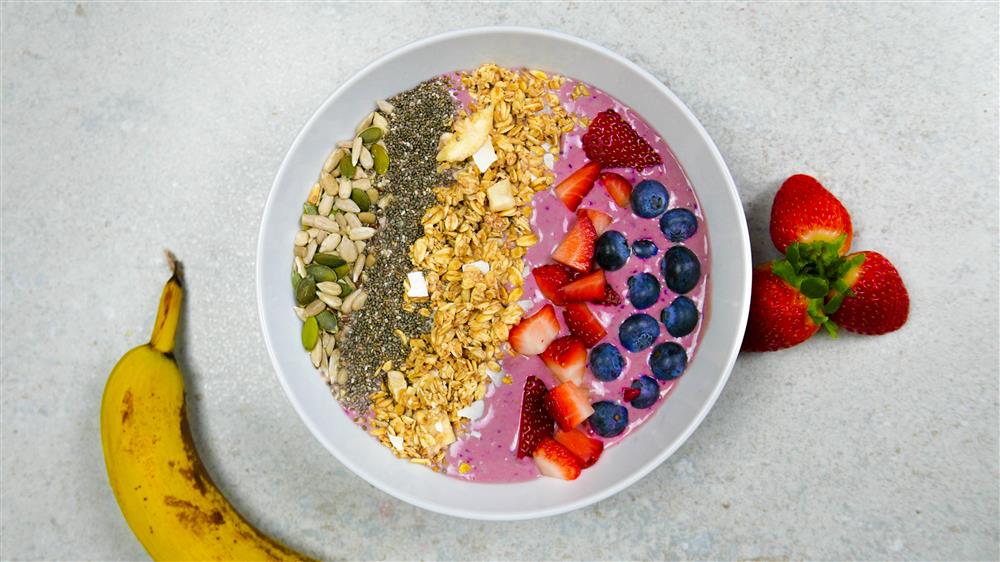
Ingredients:
- 2 Scoops The Foodstate Company's Organic Pea Protein
- 1/2 Cup Of Strawberries
- 1/2 Cup Of Blueberries
- 1/2 Cup Of Rasberries
- 1 Banana
- 250g Greek Yoghurt (Greek Yoghurt is the best as it has a thicker texture)
- Additional Toppings: Granola, Chia Seeds, Pumpkin Seeds, Sunflower Seeds - Or anything else you want to add!
Directions:
- Put all ingredients in blender and blend until pureed
- Then add greek yoghurt and blend for a few sconds so that it is mixed without thinning the texture
- Pour into bowl and add your favourite toppings!
Health Benefits:
The Foodstate Company's Organic Pea Protein:
- It is the richest plant-based protein available and is wonderfully good for you.
- It is suitable for everyone including athletes, vegans and vegetarians and those wishing to diet. You can even bake with it!
- It is: Hypoallergenic
- High in BCAAs (Branched chained amino acids)
- Easily digested
- Lactose-free
- The richest plant-based Protein
- Easily mixed in Water
- Able to help you stay full for longer
- Low in carbohydrates
- 100% Vegan

Berries
- Berries come in many shapes and sizes, but they are all healthy sources of fiber, potassium and vitamin C.
- Strawberries, Blueberries and Blackberries are low in fat and calories, and contain compounds that might protect you from certain health conditions.
- Blackberries contain powerful antioxidants that scavenge three renowned groups of harmful free radicals.
- They have also been shown to help lower undesirable LDL Cholesterol.
- Blueberries may help retard the progression of aging according to scientific papers and according to anecdotal evidence they may alleviate some eyesight ailments.
- A study of Tufts University Boston concluded “it may be possible to overcome genetic predispositions to Alzheimer disease through diet” and they cite blueberries as a food within the group associated with preventing Alzheimer disease.
- Blueberries also may help to prevent tooth decay and osteoporosis
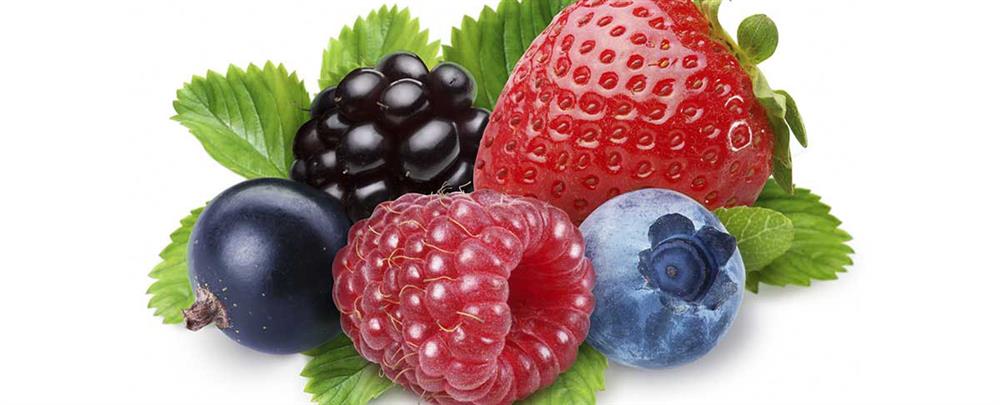
Bananas
- Bananas are one of the most widely consumed fruits in the world for good reason.
- Eating them could help lower blood pressure and reduce the risks of cancer and asthma.
- Bananas are rich in a mineral called potassium.
- This mineral is important as it helps maintain fluid levels in the body and regulates the movement of nutrients and waste products in and out of cells.
- Potassium also helps muscles to contract and nerve cells to respond.
- It keeps the heart beating regularly and can reduce the effect of sodium on blood pressure.

Chia Seeds:
- Chia Seeds have become one of the most popular superfoods in the health community due to it being nutrient-dense and packs a punch of energy-boosting power.
- Aztec warriors ate chia seeds to give them high energy and endurance. They said just one spoonful of chia could sustain them for 24 hours.
- Chia means “strength” in the Mayan language, and chia seeds were known as “runners’ food” because runners and warriors would use them as fuel while running long distances or during battle.
- Not only that, but recent research has found that the chia seeds benefits are even greater than we realized. Chia seeds benefits include promoting healthy skin, reducing signs of aging, supporting the heart and digestive system, building stronger bones and muscles, and more. They’ve even been linked to helping reverse diabetes!
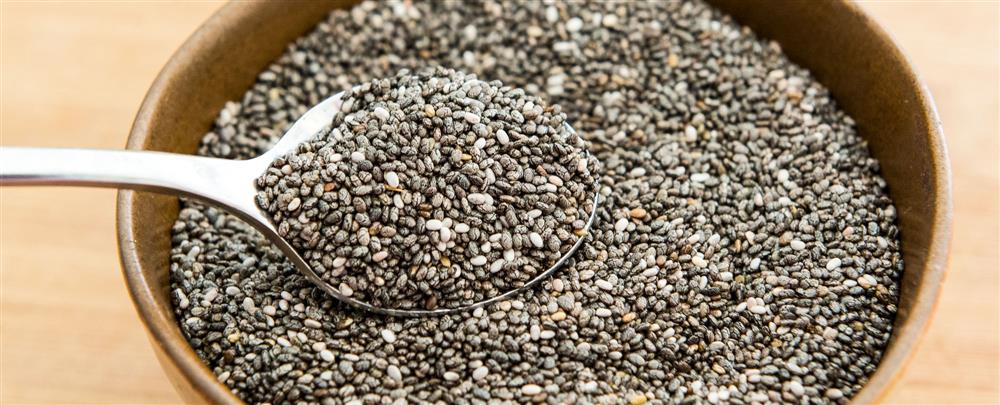
Sunflower Seeds:
- The sunflower seeds have an extremely high oil content, making them one of the main sources of polyunsaturated and monounsaturated fats. Both these fats are excellent for the overall health.
- Sunflower seeds are an excellent source of vitamin E, a fat-soluble antioxidant. Vitamin E neutralizes the effects of free radicals, preventing the damage of fat containing structures and molecules. The anti-inflammatory properties reduce the symptoms of asthma, osteoarthritis and rheumatoid arthritis.
- They enhance the immune response, thereby decreasing the risk of certain cancers. The vitamin E and high fiber content in sunflower seeds reduce the possibility of colon cancer. Selenium in sunflower seeds induces DNA repair and synthesis of damaged cells, inhibiting the proliferation of cancer cells. It also induces the self-destruct sequence to eliminate the abnormal cells.
- Sunflower seeds can decrease the severity and frequency of hot flashes in women going through their menopause, thereby reducing the development of diabetic complications.
- Sunflower seeds can also prevent the occurrence of cardiovascular diseases. Studies have shown that people who consume a good amount of vitamin E are at a much lower risk of dying due to heart attack. They reduce the levels of cholesterol in the blood. Vitamin E also prevents the free radicals from oxidizing the cholesterol. Oxidized cholesterol adheres to the blood vessels and initiates the process of atherosclerosis, which can block the arteries, leading to heart attack and stroke.
- Sunflower seeds are known to soothe nerves and ease stress and migraine. Magnesium in sunflower seeds counterbalance calcium, thereby regulating nerve and muscle tone. It prevents calcium from rushing into the nerve cell and activating it. This helps to keep the nerve relaxed. A deficiency in magnesium causes the nerve cells to become overactive, sending too many messages and causing excessive contraction.
- They contain bone healthy minerals like calcium, copper and magnesium, which prevent bone mineral density loss. They also contain Vitamin E, which eases the arthritic pain. Copper found in sunflower seeds helps in the cross linking of collagen and elastin, which provides strength and flexibility in joints and bones.
- Regular consumption of sunflower seeds will add a glow to the skin. It combats the UV rays and keeps the skin youthful and beautiful. Copper in sunflower seeds is required to produce melanin, the pigment that gives the skin its color.
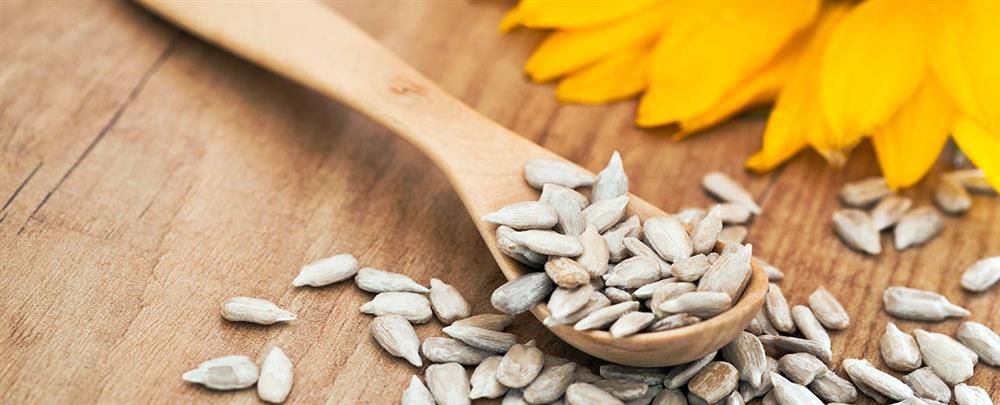
Pumpkin Seeds:
- One-quarter cup of pumpkin seeds contains nearly half of the recommended daily amount of magnesium, which participates in a wide range of vitally important physiological functions, including the creation of ATP (adenosine triphosphate, the energy molecules of your body), the synthesis of RNA and DNA, the pumping of your heart, proper bone and tooth formation, relaxation of your blood vessels, and proper bowel function.
- Magnesium has been shown to benefit your blood pressure and help prevent sudden cardiac arrest, heart attack, and stroke, yet an estimated 80 percent of Americans are deficient in this important mineral.
- Pumpkin seeds are a rich source of zinc. It is important to your body in many ways, including immunity, cell growth and division, sleep, mood, your senses of taste and smell, eye and skin health, insulin regulation, and male sexual function.
- Many are deficient in zinc due to mineral-depleted soils, drug effects, plant-based diets, and other diets high in grain. This deficiency is associated with increased colds and flu, chronic fatigue, depression, acne, low birth weight babies, learning problems and poor school performance in children, among others.
- Raw nuts and seeds, including pumpkin seeds, are one of the best sources of plant-based omega-3s (alpha-linolenic acid or ALA). We all need ALA, however, ALA has to be converted by your body into the far more essential omega-3 fats EPA and DHA -- by an enzyme in which the vast majority of us have impaired by high insulin levels. So, while pumpkin seeds are an excellent source of ALA, I believe it is essential to get some of your omega-3 fats from animal sources, such as krill oil, as well.
- Pumpkin seeds have long been valued as an important natural food for men's health. This is in part because of their high zinc content, which is important for prostate health (where it is found in the highest concentrations in the body), and also because pumpkin seed extracts and oils may play a role in treating benign prostatic hyperplasia (BPH, or enlarged prostate). Research suggests that both pumpkin seed oil and pumpkin seeds2 may be particularly beneficial in supporting prostate health.
- Animal studies suggest that pumpkin seeds may help improve insulin regulation and help prevent diabetic complications by decreasing oxidative stress
- Pumpkin seed oil is rich in natural phytoestrogens and studies suggest it may lead to a significant increase in good "HDL" cholesterol along with decreases in blood pressure, hot flashes, headaches, joint pains and other menopausal symptoms in postmenopausal women.
- Pumpkin seeds, rich in healthy fats, antioxidants and fibers, may provide benefits for heart and liver health, particularly when mixed with flax seeds.
- Pumpkin seeds are a rich source of tryptophan, an amino acid (protein building block) that your body converts into serotonin, which in turn is converted into melatonin, the "sleep hormone." Eating pumpkin seeds a few hours before bed, along with a carbohydrate like a small piece of fruit, may be especially beneficial for providing your body the tryptophan needed for your melatonin and serotonin production to help promote a restful night's sleep.
- Pumpkin seed oil has been found to exhibit anti-inflammatory effects. One animal study even found it worked as well as the anti-inflammatory drug indomethacin in treating arthritis, but without the side effects.







